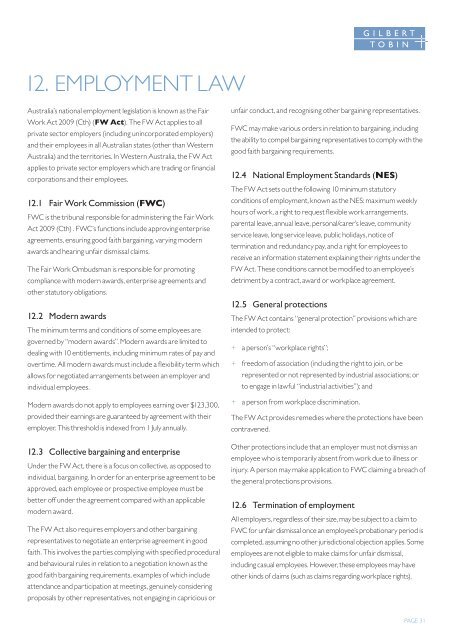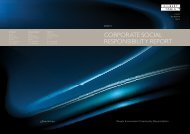Gilbert + tobin - Gilbert and Tobin
Gilbert + tobin - Gilbert and Tobin
Gilbert + tobin - Gilbert and Tobin
You also want an ePaper? Increase the reach of your titles
YUMPU automatically turns print PDFs into web optimized ePapers that Google loves.
12. Employment law<br />
Australia’s national employment legislation is known as the Fair<br />
Work Act 2009 (Cth) (FW Act). The FW Act applies to all<br />
private sector employers (including unincorporated employers)<br />
<strong>and</strong> their employees in all Australian states (other than Western<br />
Australia) <strong>and</strong> the territories. In Western Australia, the FW Act<br />
applies to private sector employers which are trading or financial<br />
corporations <strong>and</strong> their employees.<br />
12.1 Fair Work Commission (FWC)<br />
FWC is the tribunal responsible for administering the Fair Work<br />
Act 2009 (Cth) . FWC’s functions include approving enterprise<br />
agreements, ensuring good faith bargaining, varying modern<br />
awards <strong>and</strong> hearing unfair dismissal claims.<br />
The Fair Work Ombudsman is responsible for promoting<br />
compliance with modern awards, enterprise agreements <strong>and</strong><br />
other statutory obligations.<br />
12.2 Modern awards<br />
The minimum terms <strong>and</strong> conditions of some employees are<br />
governed by “modern awards”. Modern awards are limited to<br />
dealing with 10 entitlements, including minimum rates of pay <strong>and</strong><br />
overtime. All modern awards must include a flexibility term which<br />
allows for negotiated arrangements between an employer <strong>and</strong><br />
individual employees.<br />
Modern awards do not apply to employees earning over $123,300,<br />
provided their earnings are guaranteed by agreement with their<br />
employer. This threshold is indexed from 1 July annually.<br />
12.3 Collective bargaining <strong>and</strong> enterprise<br />
Under the FW Act, there is a focus on collective, as opposed to<br />
individual, bargaining. In order for an enterprise agreement to be<br />
approved, each employee or prospective employee must be<br />
better off under the agreement compared with an applicable<br />
modern award.<br />
The FW Act also requires employers <strong>and</strong> other bargaining<br />
representatives to negotiate an enterprise agreement in good<br />
faith. This involves the parties complying with specified procedural<br />
<strong>and</strong> behavioural rules in relation to a negotiation known as the<br />
good faith bargaining requirements, examples of which include<br />
attendance <strong>and</strong> participation at meetings, genuinely considering<br />
proposals by other representatives, not engaging in capricious or<br />
unfair conduct, <strong>and</strong> recognising other bargaining representatives.<br />
FWC may make various orders in relation to bargaining, including<br />
the ability to compel bargaining representatives to comply with the<br />
good faith bargaining requirements.<br />
12.4 National Employment St<strong>and</strong>ards (NES)<br />
The FW Act sets out the following 10 minimum statutory<br />
conditions of employment, known as the NES: maximum weekly<br />
hours of work, a right to request flexible work arrangements,<br />
parental leave, annual leave, personal/carer’s leave, community<br />
service leave, long service leave, public holidays, notice of<br />
termination <strong>and</strong> redundancy pay, <strong>and</strong> a right for employees to<br />
receive an information statement explaining their rights under the<br />
FW Act. These conditions cannot be modified to an employee’s<br />
detriment by a contract, award or workplace agreement.<br />
12.5 General protections<br />
The FW Act contains “general protection” provisions which are<br />
intended to protect:<br />
+ + a person’s “workplace rights”;<br />
+ + freedom of association (including the right to join, or be<br />
represented or not represented by industrial associations; or<br />
to engage in lawful “industrial activities”); <strong>and</strong><br />
+ + a person from workplace discrimination.<br />
The FW Act provides remedies where the protections have been<br />
contravened.<br />
Other protections include that an employer must not dismiss an<br />
employee who is temporarily absent from work due to illness or<br />
injury. A person may make application to FWC claiming a breach of<br />
the general protections provisions.<br />
12.6 Termination of employment<br />
All employers, regardless of their size, may be subject to a claim to<br />
FWC for unfair dismissal once an employee’s probationary period is<br />
completed, assuming no other jurisdictional objection applies. Some<br />
employees are not eligible to make claims for unfair dismissal,<br />
including casual employees. However, these employees may have<br />
other kinds of claims (such as claims regarding workplace rights).<br />
PAGE 31







